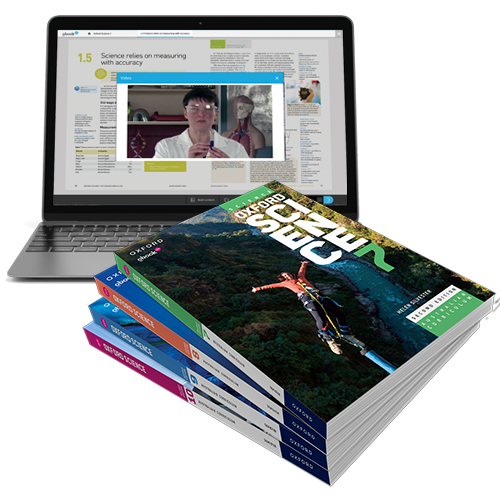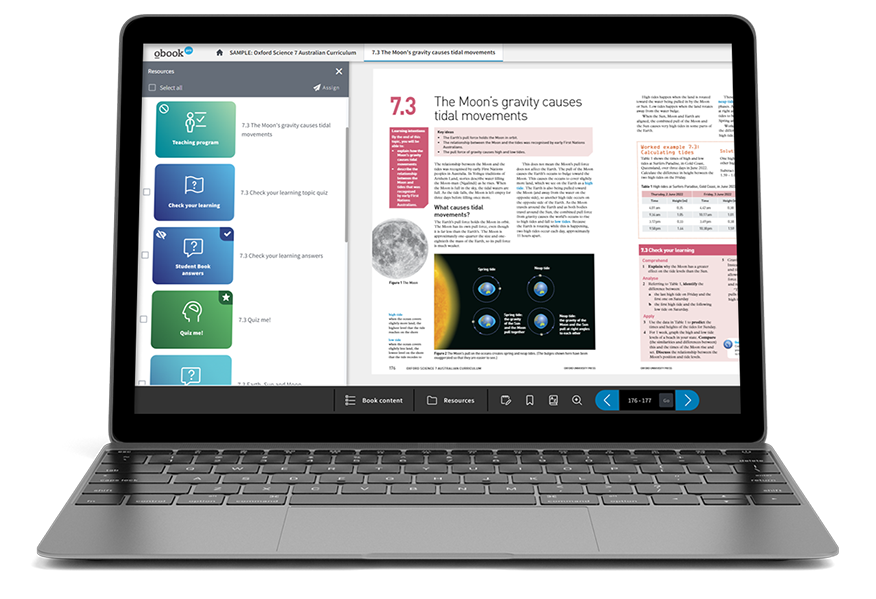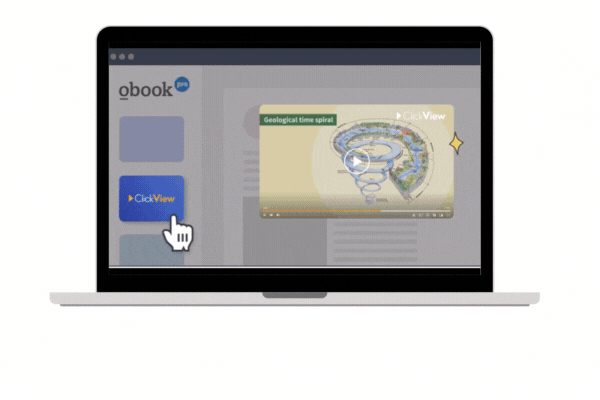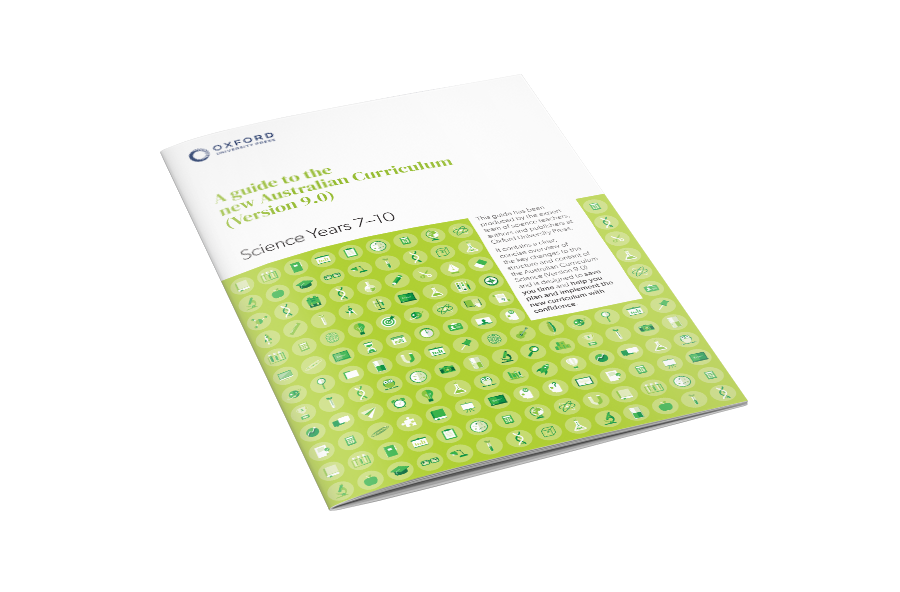Build Science Inquiry Skills with Oxford Science 7-10
The Australian Curriculum has changing and Oxford is here to support your transition. In science, there is a stronger focus on students mastering the essential facts, skills, concepts and processes, and being introduced to these at the right time.
Oxford Science 7–10 is a new teaching and learning resource written for the new Australian Curriculum Science (Version 9.0).
Featuring an innovative reporting system that makes it easy for you to identify misconceptions and deliver differentiated, personalised learning experiences, build students’ confidence, and save time planning lessons.


Supporting teachers with obook pro
Premium digital content thoughtfully curated to provide you a roadmap for teaching the new curriculum.
Sample teaching resources now available.
- Year 7 Curriculum Grid
- Years 7–10 Course Planner
- Year 8 Lesson Plans
Full sample
Oxford Science 7 Australian Curriculum
Oxford Science 7
Australian Curriculum
Student Book + obook pro
ISBN: 9780190332372
Student Book + obook pro
Buy now Learn moreStudent Book + obook pro ?Print Student Book with digital obook pro access for 12 months from the date of activation
Oxford Science 7
Australian Curriculum
Student obook pro
ISBN: 9780190332389
Student obook pro
Buy now Learn moreStudent obook pro ?Digital Student obook pro access for 12 months from the date of activation
Oxford Science 7
Australian Curriculum
Teacher obook pro
Teacher digital access available to adopting schools
Teacher obook pro ?Free Teacher obooks are only available to schools adopting our series with Student books. Speak to your local education consultant for an annual subscription.
Oxford Science 7
Australian Curriculum
Value Pack
ISBN: 9780190345983
Value Pack - Print and Digital
Learn more Value Pack - Print and Digital
?Includes:
Oxford HASS
Oxford MyEnglish
Oxford Science
Oxford Maths
Oxford Science 7
Australian Curriculum
Value Pack (Digital)
ISBN: 9780190345990
Value Pack - Digital
Learn more Value Pack - Digital
?Includes:
Oxford HASS
Oxford MyEnglish
Oxford Science
Oxford Maths
Oxford Science 8 Australian Curriculum
Oxford Science 8
Australian Curriculum
Student Book + obook pro
ISBN: 9780190332457
Student Book + obook pro
Buy now Learn moreStudent Book + obook pro ?Print Student Book with digital obook pro access for 12 months from the date of activation
Oxford Science 8
Australian Curriculum
Student obook pro
ISBN: 9780190332464
Student obook pro Buy now Learn more
Student obook pro ?Digital Student obook pro access for 12 months from the date of activation
Oxford Science 8
Australian Curriculum
Teacher obook pro
Teacher digital access available to adopting schools
Teacher obook pro ?Free Teacher obooks are only available to schools adopting our series with Student books. Speak to your local education consultant for an annual subscription.
Oxford Science 8
Australian Curriculum
Value Pack
ISBN: 9780190346010
Value Pack - Print and Digital
Learn more Value Pack - Print and Digital
?Includes:
Oxford HASS
Oxford MyEnglish
Oxford Science
Oxford Maths
Oxford Science 8
Australian Curriculum
Value Pack (Digital)
ISBN: 9780190346027
Value Pack - Digital
Learn more Value Pack - Digital
?Includes:
Oxford HASS
Oxford MyEnglish
Oxford Science
Oxford Maths
Oxford Science 9 Australian Curriculum
Oxford Science 9
Australian Curriculum
Student Book + obook pro
ISBN: 9780190332532
Student Book + obook pro
Buy now Learn moreStudent Book + obook pro ?Print Student Book with digital obook pro access for 12 months from the date of activation
Oxford Science 9
Australian Curriculum
Student obook pro
ISBN: 9780190332549
Student obook pro
Buy now Learn moreStudent obook pro ?Digital Student obook pro access for 12 months from the date of activation
Oxford Science 9
Australian Curriculum
Teacher obook pro
Teacher digital access available to adopting schools
Teacher obook pro ?Free Teacher obooks are only available to schools adopting our series with Student books. Speak to your local education consultant for an annual subscription.
Oxford Science 9
Australian Curriculum
Value Pack
ISBN: 9780190346041
Value Pack - Print and Digital
Learn more Value Pack - Print and Digital
?Includes:
Oxford HASS
Oxford MyEnglish
Oxford Science
Oxford Maths
Oxford Science 9
Australian Curriculum
Value Pack (Digital)
ISBN: 9780190346058
Value Pack - Digital
Learn more Value Pack - Digital
?Includes:
Oxford HASS
Oxford MyEnglish
Oxford Science
Oxford Maths
Oxford Science 10 Australian Curriculum
Oxford Science 10
Australian Curriculum
Student Book + obook pro
ISBN: 9780190332617
Student Book + obook pro
Buy now Learn moreStudent Book + obook pro ?Print Student Book with digital obook pro access for 12 months from the date of activation
Oxford Science 10
Australian Curriculum
Student obook pro
ISBN: 9780190332624
Student obook pro
Buy now Learn moreStudent obook pro ?Digital Student obook pro access for 12 months from the date of activation
Oxford Science 10
Australian Curriculum
Teacher obook pro
Teacher digital access available to adopting schools
Teacher obook pro ?Free Teacher obooks are only available to schools adopting our series with Student books. Speak to your local education consultant for an annual subscription.
Oxford Science 10
Australian Curriculum
Value Pack
ISBN: 9780190346072
Value Pack - Print and Digital
Learn more Value Pack - Print and Digital
?Includes:
Oxford HASS
Oxford MyEnglish
Oxford Science
Oxford Maths
Oxford Science 10
Australian Curriculum
Value Pack (Digital)
ISBN: 9780190346089
Value Pack - Digital
Learn more Value Pack - Digital
?Includes:
Oxford HASS
Oxford MyEnglish
Oxford Science
Oxford Maths
Bring the curriculum to life with thousands of curriculum-aligned videos
Oxford University Press Australia is delighted to announce a unique partnership with
ClickView
– Australia's leading video solution for schools – to deliver thousands of brand-new, curriculum-aligned videos for secondary schools across Australia.
Find out more

In May 2022, an updated version of Australian Curriculum Science for Years 7–10 (known as Version 9.0) was released by the Australian Curriculum, Assessment and Reporting Authority (ACARA).
From Term 1 2023, schools around Australia will begin to implement the Australian Curriculum Science (Version 9.0), most according to their own state and territory timelines.
Schools in some states and territories will be required to adopt the new curriculum in its entirety, while curriculum bodies in other states and territories will adapt the new curriculum and integrate it into their existing state curricula.
Regardless of the approach taken in your state, the Australian Curriculum forms the basis of all state and territory curricula, so this change will affect aspects of teaching and learning across Australia.
We're here to support you. Register your interest to stay up to date with implementation news in your state or territory and to receive invitations to professional development events and access to sample pages of Oxford’s Australian Curriculum resources.





